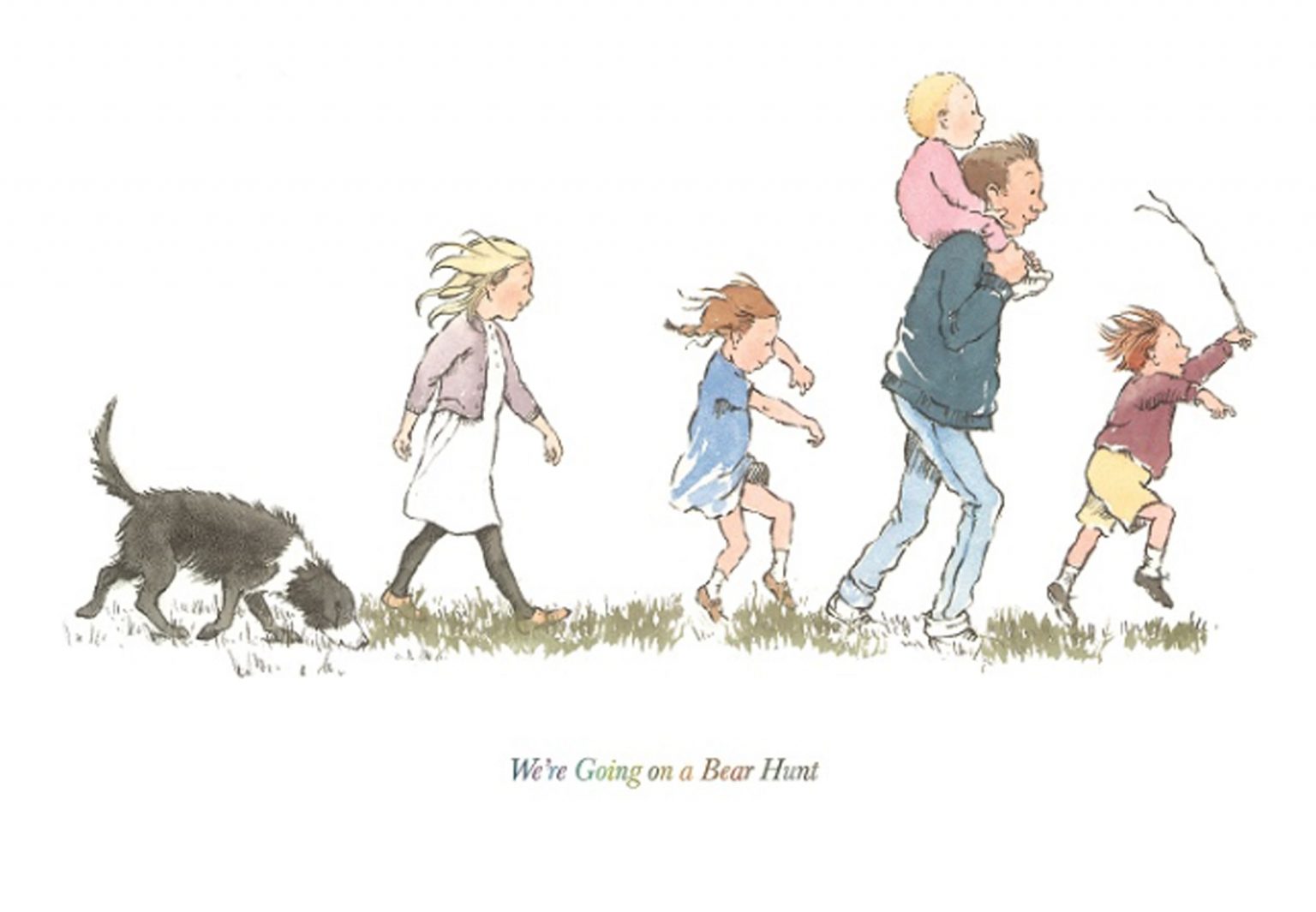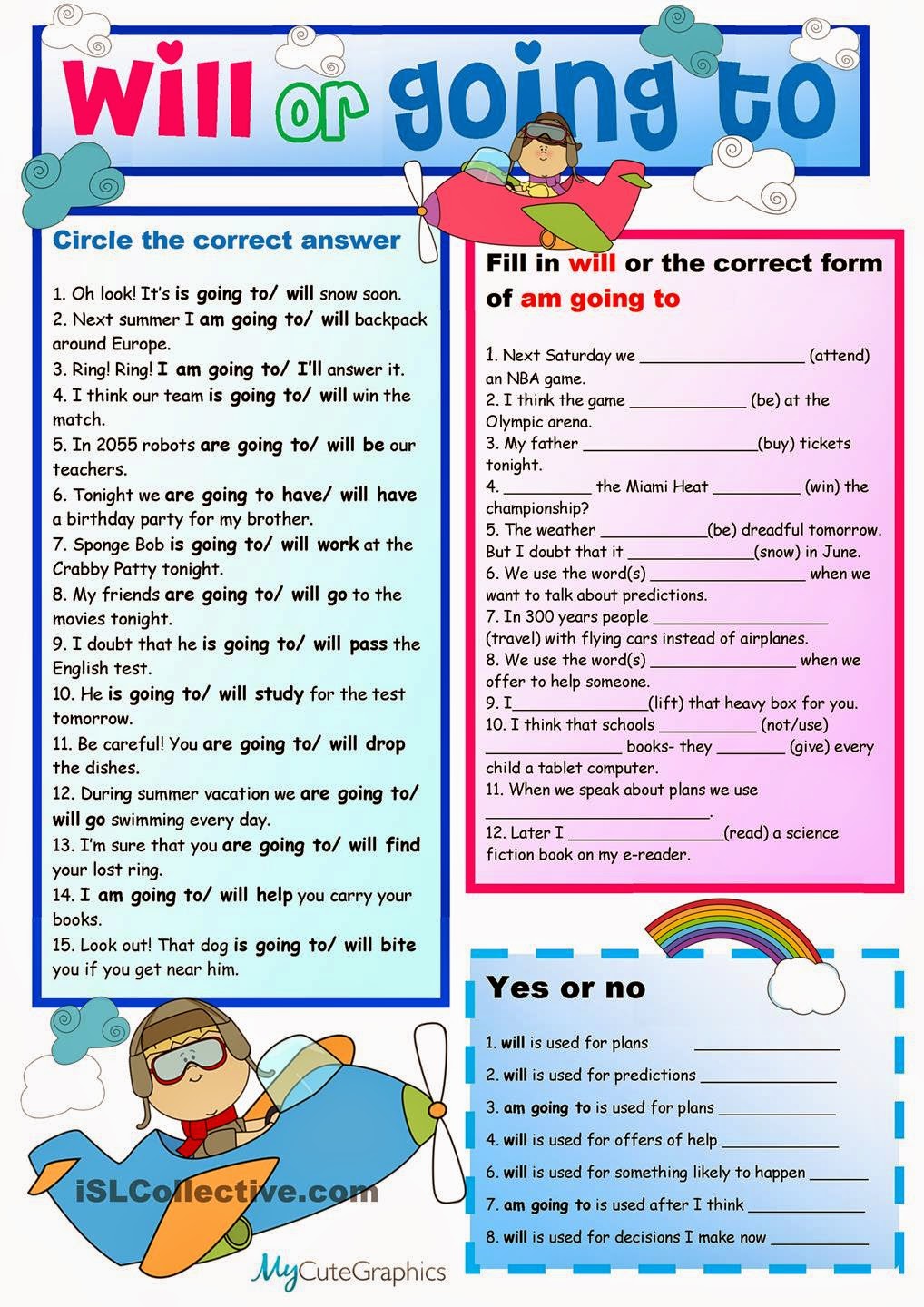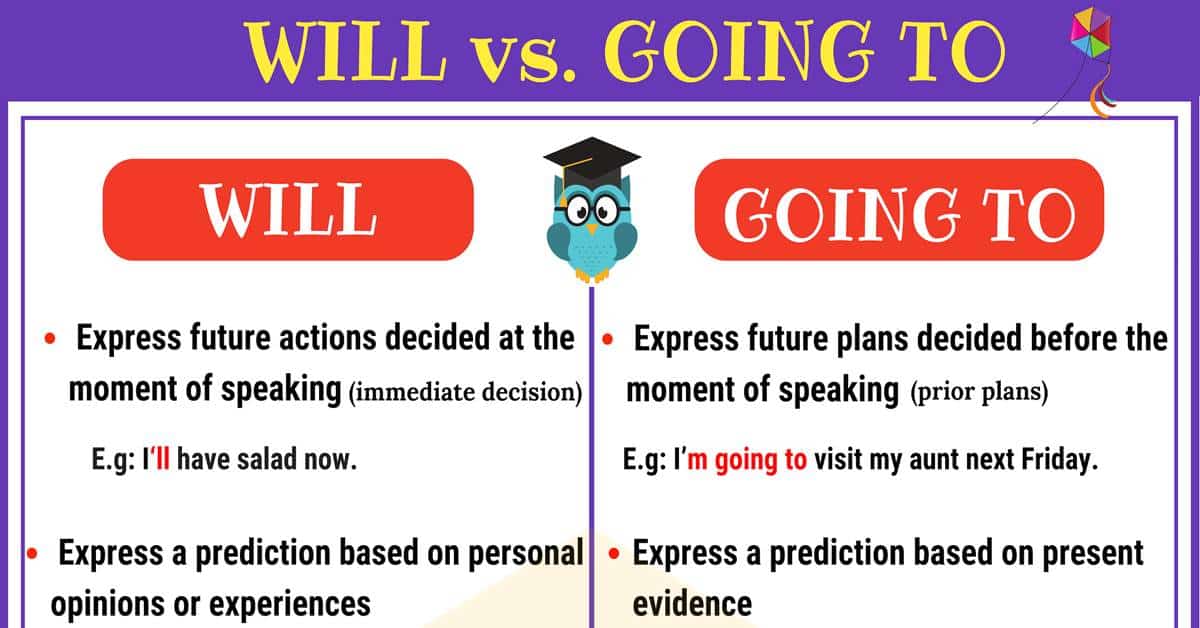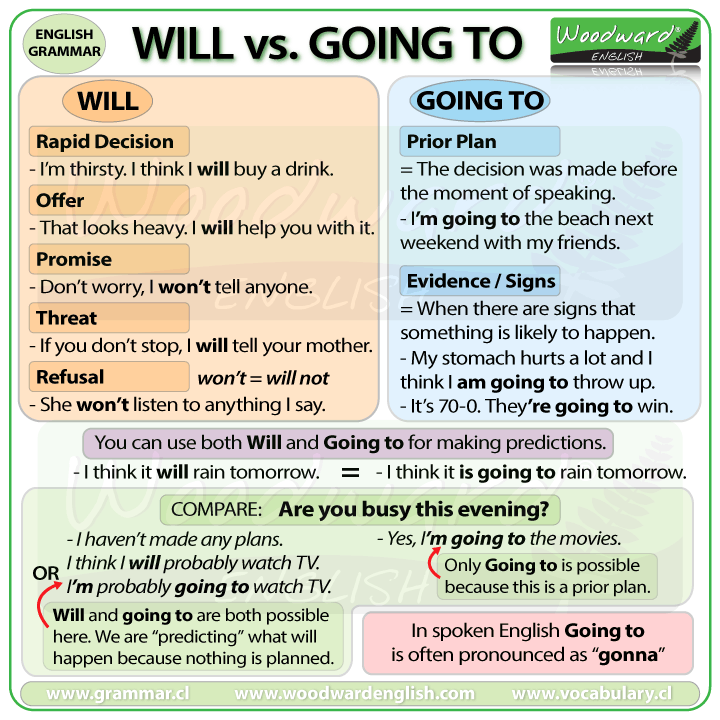
Where we going? r/SatisfactoryGame
Be careful! We do not normally use will in time clauses and if-clauses: . I'll come home when I finish work.(NOT will finish work) We won't be able to go out if it rains.(NOT will rain). but we can use will if it means want to or be willing to:. I will be very happy if you will come to my party. We should finish the job early if George will help us.

Will vs. Going to Differences Between Will and Going to • 7ESL English grammar, Learn english
We use the present continuous tense for definite future arrangements. Often, it doesn't really matter if we choose 'be going to' or the present continuous. In the following example, there is really very little difference in meaning: I'm going to the cinema tonight. I'm going to go to the cinema tonight. We use the present simple tense in two.

How Are We Going to Get There? Redemption Church
For affirmative sentences we use "am/is/are going to" + "verb". For negative sentences we use "not" after "am/is/are". See the animated sentences below to learn the structure of "be going to" future tense. John. a shirt. QUICK LINKS IN THIS PAGE. Examples with Pictures. Dialogue exercise. Sentence scramble game.

We're Going on a Bear Hunt EAS Art Gallery Dundee
I am going to move to Prague. → to be going to. He was going home. → Past Continuous. He was going to talk to her. → to be going to. Be going to + infinitive in the present and the past tenses. Use: to express an intention and to predict the future. Voiced examples.

Valme's English Corner Future WILL vs. Fut. Be GoinG To
I'm going to phone Mum after dinner. I told her I'd call at 8 o'clock. I'm going to wear my black dress tonight. I'm going to go to the supermarket after work. What do we need? Present continuous. We usually use the present continuous when the plan is an arrangement - already confirmed with at least one other person and we know the time and.

Will vs. Be Going To, key included English ESL worksheets pdf & doc
The Difference Between "Will" and "Going To" Imagine if one of Queen's hit songs, "We will rock you," disregarded the difference between "will" and "going to." We are going to, we are going to rock you" just wouldn't have sounded as catchy, and the song probably wouldn't have been quite as popular. Keep this in mind.

Where are we going? ArtMarketDirect
When using "will," we can form a simple future negative using the formula will + not + the root form of the verb you want to convey. Examples: I will not go to Jen's party this Saturday. Sarah will not buy a dog because she wants to adopt one. Similarly, you can form the simple future negative of the phrase "be going to" using the.

We're Going on a Bear Hunt Book by Michael Rosen, Helen Oxenbury Official Publisher Page
1. to be going to + base form of a verb (or verb1) "I am going to be fine." This form is usually used to talk about future plans. "I am going to visit you soon." "I am going to the doctor tomorrow." 2. will + base form of verb (or verb1) "I will be fine." This form is usually used to talk about a promise or a voluntary action. "I will call him."

Pin on English Talks
The phrase "be going to" is always followed by the base form of the main verb. The verb "be" needs to be conjugated according to the subject of the sentence. For example, "I am going to," "she is going to," "they are going to," etc. The negative form of be going to is formed by adding "not" between "be" and "going.".

Where Are We Going? Part 1 YouTube
Future: be going to ( I am going to work ) - English Grammar Today - a reference to written and spoken English grammar and usage - Cambridge Dictionary

تدريبات على will و going to موسوعة إقرأ تدريبات على will و going to
4. &. [Verse 1] G Fall is here, hear the yell G Back to school, ring the bell C Brand new shoes, walking blues G Climb the fence, books and pens D C G I can tell that we are gonna be friends D C G I can tell that we are gonna be friends [Verse 2] G Walk with me, Suzy Lee G Through the park, and by the tree C We will rest upon the ground G and.

Focus on the CAN and not the CAN’T Primal Perks
Oct 17, 2014 at 21:08. 1. @ruakh- you and Hellion are probably right in your assessment of the desired usage but there's nothing in the question that makes that specific. "I will be going to the store in ten minutes" is a type of future usage in my book. - Jim. Oct 17, 2014 at 21:22. You should watch this week's episode of "The Big Bang Theory".

We're Going on a Bear Hunt Book by Michael Rosen, Helen Oxenbury Official Publisher Page
We can use "going to" to express a prediction (a guess or estimate) about what may happen in the future based on what is happening right now. Examples: It's 7 PM and the sun is going down. It 's going to be dark soon. Look at the line. It 's going to take a long time to get a table. The sun is coming out.

where are we going? Word Scramble WordMint
I had been going to fix the car for ages. going to Quiz. Play these going to games. Watch these gonna videos. EnglishClub : Learn English : Grammar : Verbs : going to. The structure of GOING TO is: subject + BE + GOING + to-infinitive. We use GOING TO to indicate intention (example: I am going to buy a car) and prediction (It's going to snow).

We Going
Learn when to use the simple future verb tense with "be going to" in this Ellii grammar video! We will also teach you contracted forms that are very common w.

Future Tense Will vs. Going To English Grammar
Note this difference: Be going to is usually used for future events where the speaker expresses his or her intention.; Will is used to express decisions made at the moment of speaking.
- Mi Manda Rai Tre Quando Va In Onda
- Diocesi Di S Angelo Dei Lombardi
- Licenza Pesca Tipo B Piemonte
- Mean Girls 2024 Streaming Eng
- 10 Lire 1940 Vittorio Emanuele Valore
- Ha Interpretato Con Al Pacino Sfida Senza Regole
- The Nun 2 Streaming Ita
- Battlestar Galactica Tv Show Cast
- Teatro Olimpico Di Vicenza Spettacoli
- Divieto Assunzione Dopo Licenziamento Per Giustificato Motivo Oggettivo
